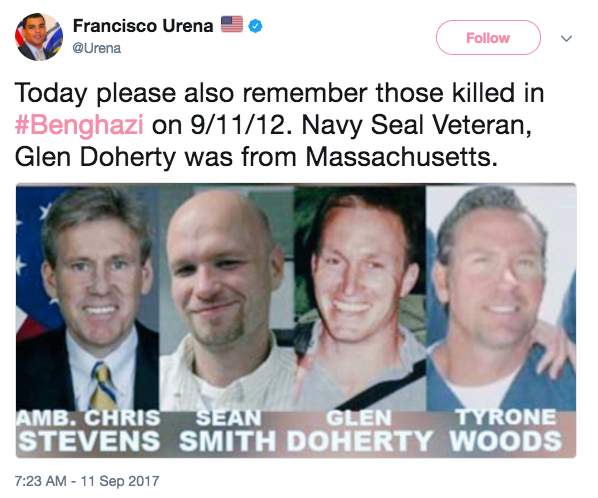The federal trial for Libyan militia leader Ahmed Abu Khattala, the alleged mastermind behind the 2012 terror attacks on the U.S. government facilities in Benghazi, Libya, started this week, and U.S. Ambassador Chris Stevens’ bodyguard has testified.
Diplomatic Security Special Agent Scott Wickland, the ambassador’s bodyguard and one of the survivors, said in his testimony this week that Stevens’ last words to him were: “When I die, you need to pick up my gun and keep fighting,” the Daily Mail reported.

Ambassador Chris Stevens’ last words to bodyguard (Twitter)
Stevens was one of four Americans to be killed during the attacks five years ago. Also killed in the attacks were U.S. Foreign Service Information Management Officer Sean Smith; and CIA contractors and former Navy SEALs Tyrone Woods and Glen Doherty.

Benghazi victims (Twitter)
Kris “Tanto” Paronto told American Military News on Wednesday that while he didn’t know Stevens personally, he was “a very good man and was doing good things there in Libya.”
“The people loved him,” Paronto said. “There was a massive protest when they found out he died. He epitomized what a diplomat should be.”
Paronto is one of the survivors and heroes of the 2012 terror attacks on the U.S. government facilities in Benghazi, Libya, where he was part of the CIA security team there. He fought off terrorists for more than 13 hours and saved more than 20 lives. His account of the attack is told in the book “13 Hours,” and he has also penned the book “The Ranger Way.” He is a former U.S. Army Ranger from the 2nd Battalion, 75th Ranger Regiment.
Partono told American Military News that the terrorist’s trial is “a joke.”
If convicted, Khattala faces a life sentence. He is on trial for 18 counts that include murder, attempted murder, material support of terrorism and destruction of U.S. facilities.
“The guy [Khattala] is obviously a combatant. He needs to be put in [Guantanamo Bay] or put to death,” Paronto said. “Otherwise the trial is a waste of money, and something for TV and politicians.”
Paronto said he didn’t think a trial was necessary, and that it’s “wasting money for a war criminal to be put on trial.”
While the trial is a “sideshow,” Wickland’s testimony is accurate, Paronto pointed out.
Following Wickland’s testimony this week, the Washington Post also reported:
As [Stevens’] bodyguard […], Wickland was the last person to see him and an aide alive as they tried to escape a burning mission villa. Wickland also was at the wheel of an armored car evacuating U.S. security personnel that ran a gauntlet of hostile fire to the CIA annex, only to have the attack trail them and mortar rounds kill two more Americans and wound one of Wickland’s close friends just feet away from him on a rooftop.
“They all looked like they had seen a ghost,” said Wickland, describing agents’ reactions at finding him alive outside the villa. “My face was covered in soot, my eyes were black, my teeth were black.”
On Sept. 11, 2012, at around 9:40 p.m. local time, a large number of armed men attacked the government compound in Benghazi. Stevens and Smith died from smoke inhalation, while Woods and Doherty were killed by two separate mortar rounds that hit their position at the CIA annex.
The 800-page report revealed that in the months leading up to the attack, there was worsening security in Libya, poor bureaucratic leadership and inadequate resources. The report showed Clinton and the State Department’s inadequacy to protect the Libyan diplomatic outpost. The report also revealed that the CIA missed the threat and wrote faulty intelligence after the attack.
Clinton told a U.S. House committee that she was aware of the dangers in Libya but “there was no actionable intelligence” indicating a planned terrorist attack. The report showed that intelligence was available, but Clinton and her top aide, Patrick Kennedy, failed to realize the risk of a potential attack.
The 800 page report took more than 2 years to investigate and complete.



